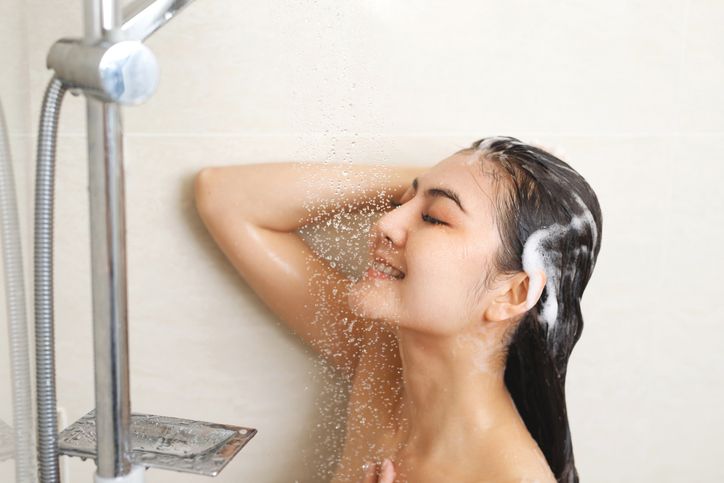
- Home
- Trend
- Weight Loss Strategies
- Acne Tips
- Hair Health Information
- Blemish Removal Tips
- Acne Scar Removal Tips
- Muscle Building Techniques
- Intimate Care Tips
- Postpartum Intimate Care
- Eye Bags Wiki
- Tips for Face Slimming
- Secret of Permanent Hair Removal
- Breast Enlargement Tips
- Cure to Snoring
- Marionette Lines
- Skin-Tightening Secrets
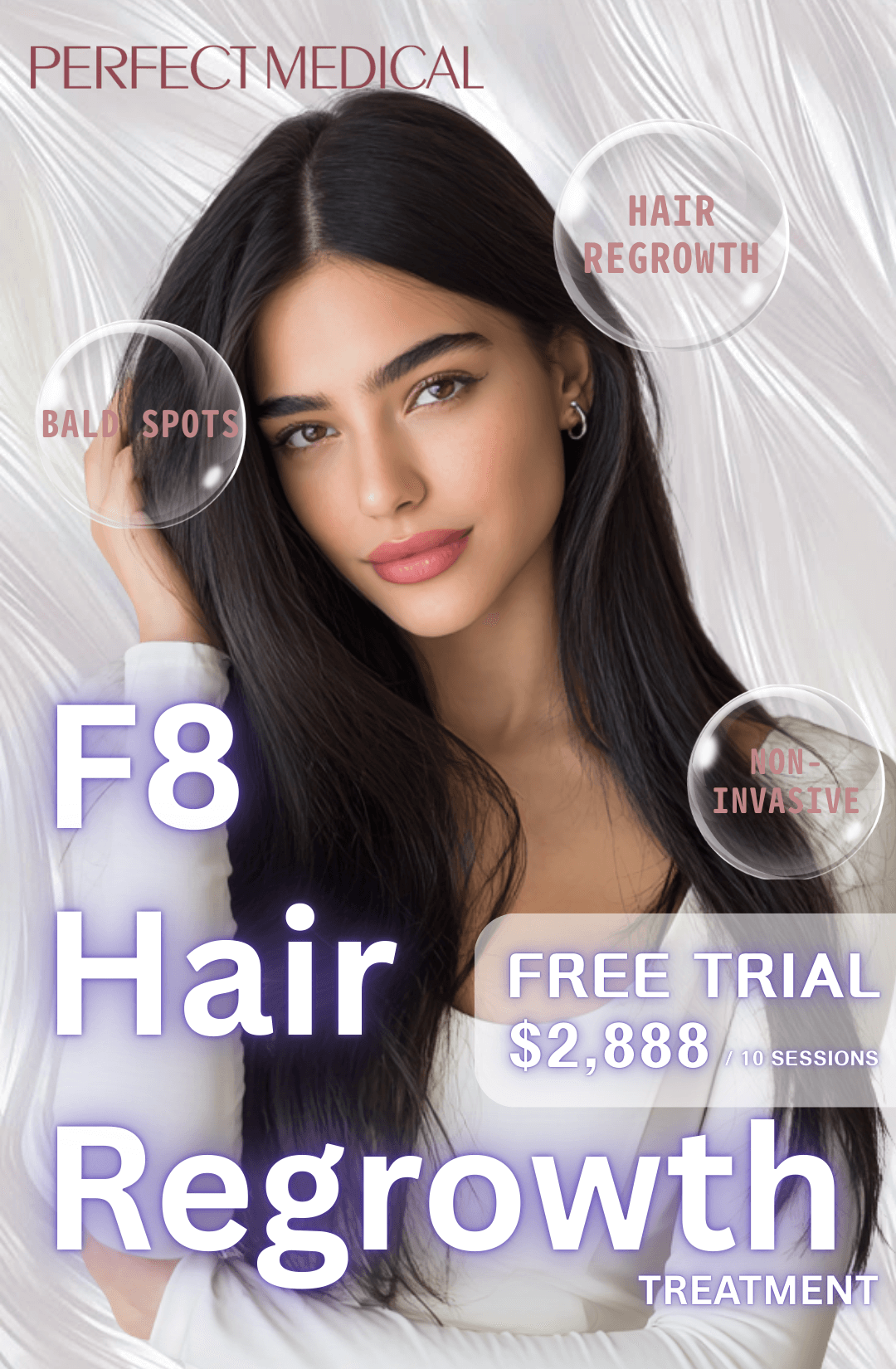
免費體驗
F8 Hair Regrowth Treatment
1 Minute Self-Registration
Date should not be before minimal date
Singapore's vibrant and bustling lifestyle offers many opportunities and experiences, but it can also bring about challenges, including hair fall. Hair fall affects both men and women and can be caused by various factors such as stress, pollution, diet, and genetics. However, the good news is that with the right knowledge and care, you can reduce hair fall and achieve healthy, luscious locks. In this comprehensive guide, we will explore effective strategies, home remedies, and professional treatments to combat hair fall in Singapore and regain your confidence!
1
Understanding Hair Fall and its Causes
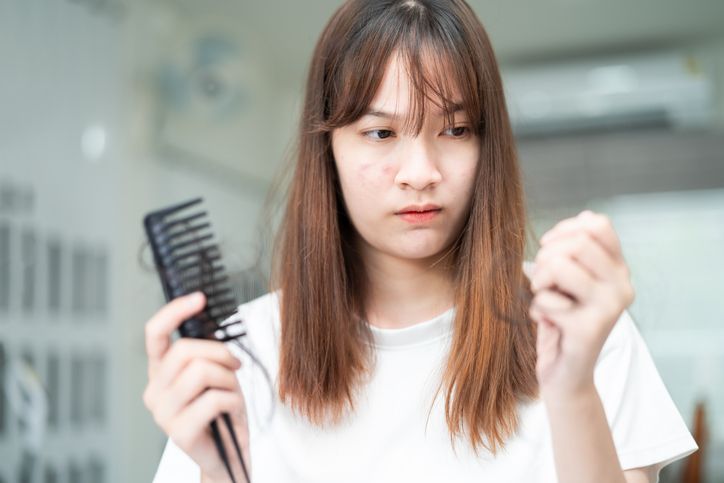
Hair fall, also known as hair loss or alopecia, is a common condition that affects individuals of all ages. Understanding the root causes of hair fall is crucial in developing an effective plan to combat it. The following are some common causes of hair fall:
1. Stress and anxiety
It may seem like a surprise to you, but elevated stress levels can disturb the normal hair growth cycle, leading to excessive hair fall. Stress-induced hair fall, known as telogen effluvium, occurs when a significant number of hair follicles enter the resting phase prematurely. It's one of the main causes of why modern people have a hard time maintaining healthy hair volume. A stressful event, such as a traumatic experience or major surgery, can trigger this condition, resulting in noticeable hair loss a few months later.
2. Genetics
A family history of hair loss can increase an individual's susceptibility to hair fall. Genetic factors play a substantial role in determining the pattern and severity of hair loss. For instance, individuals with a genetic predisposition to male or female pattern baldness are more likely to experience hair fall as they age.
3. Hormonal imbalance
Fluctuations in hormone levels can trigger hair fall, particularly in specific life stages like pregnancy or menopause for women. Hormonal changes during these periods can disrupt the natural hair growth cycle. For example, during pregnancy, elevated levels of certain hormones can prolong the growth phase of hair, resulting in reduced hair shedding. However, after childbirth, hormonal shifts can lead to a sudden increase in hair fall.
4. Nutritional deficiencies
Lack of crucial nutrients such as iron, zinc, and vitamins can significantly weaken hair follicles, ultimately leading to hair fall, . For instance, an iron deficiency can hinder proper oxygen supply to hair follicles, causing them to become weak and brittle.
5. Environmental factors
Exposure to environmental pollutants and harsh conditions can have a detrimental impact on hair health. Pollution particles can accumulate on the scalp, clogging hair follicles and impeding hair growth. UV radiation from the sun can also weaken hair proteins, making the hair more susceptible to breakage. For example, individuals living in urban areas with high pollution levels may experience increased hair fall due to the damaging effects of airborne pollutants.
By reordering and elaborating on these sections with examples, you can create a more comprehensive understanding of the factors contributing to hair fall.
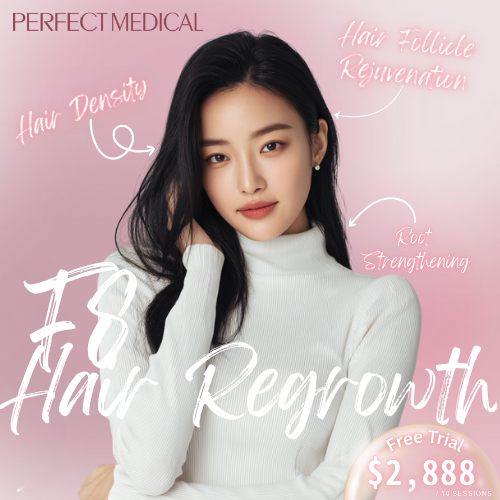
2
Develop an Effective Hair Care Routine to Enjoy Increased Hair Thickness
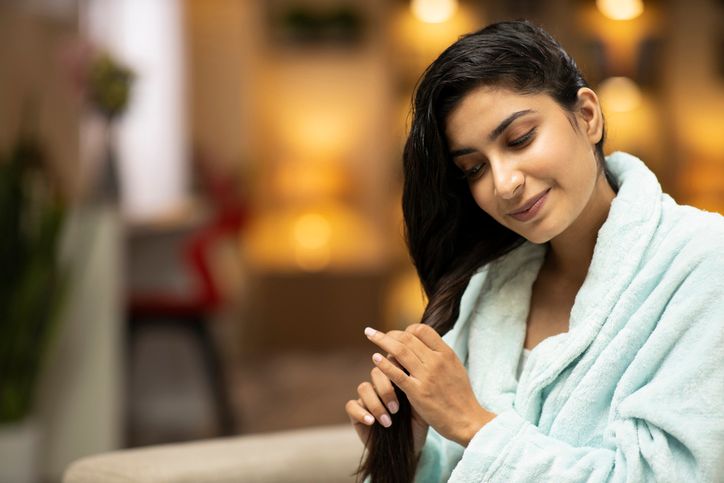
Maintaining healthy hair and preventing hair fall is essential no matter what age you are at since hair loss occurs anytime. Here are some tailored tips to help you create a hair care routine that suits your needs:
1. Choose a suitable shampoo and conditioner
Opt for a mild shampoo and conditioner that are well-suited to Singapore's humidity and your hair type. With the high humidity levels, using a product that balances moisture without weighing down your hair is crucial.
2. Regular trimming to beat the humidity
Given Singapore's humid weather, getting regular hair trims becomes even more important. Trimming helps eliminate split ends that are prone to frizz in humid conditions, promoting healthier hair growth.
3. Revitalise your scalp with massages
Massaging your scalp is a great way to improve blood circulation, helping your hair follicles receive more nutrients. This practice becomes especially beneficial in a warm climate like Singapore, where the increased blood flow can support hair health.
4. Embrace natural styles overheat styling
The tropical climate can make hair more vulnerable to damage, so it's advisable to minimise the use of heating tools and excessive styling. Embrace natural hairstyles that require less heat, reducing the risk of weakening hair strands and breakage.
5. UV protection for hair
Singapore's strong sun can be harsh on your hair. Consider using hair products with UV protection or wearing a hat when you're out in the sun for extended periods. This shields your hair from the harmful effects of UV rays and prevents colour fading.
6. Hydration for your hair
Just like your skin, your hair needs hydration in Singapore's heat. Use a leave-in conditioner or hair serum to provide extra moisture, combating dryness caused by the climate.
7. Control humidity-induced frizz
Invest in anti-frizz products that can help manage frizz caused by the humidity. These products can keep your hair looking sleek and manageable even in damp conditions.
- Optimising Hair Health: Choosing the Best Hair Fall Shampoo For Yourself
- 7 Benefits of Scalp Scrubs! Can They Help with Oily Scalp and Odor? What About Dry Scalps?
- A Complete Guide To Fast Hair Regrowth Methods, Habits, And Nutrition
- What Causes An Itchy Scalp? 7 Common Triggers + Remedies To Soothe Itchiness
3
Home Remedies You Need to Know If You Experience Thinning Hair
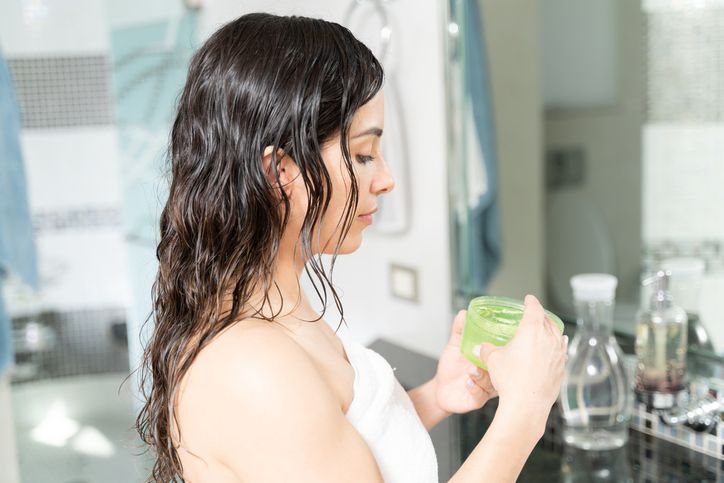
Incorporating natural remedies into your hair care routine can be particularly beneficial in Singapore's climate. Here are some popular home remedies that can help reduce hair fall and enhance the health of your hair:
1. Aloe vera for soothing scalp care
With Singapore's humidity, scalp inflammation can be a concern. Applying fresh aloe vera gel directly onto your scalp can help soothe irritation and promote hair growth. Aloe vera's cooling properties are especially useful in the tropical climate.
2. Nourishment with coconut oil
Coconut oil's nourishing benefits can be a lifesaver in combating dryness caused by the humidity. Massaging warm coconut oil onto your scalp and leaving it on overnight can provide deep hydration. This remedy works well in replenishing lost moisture and strengthening hair strands.
3. Onion juice for hair follicle stimulation
Singapore's humid weather can sometimes lead to hair fall. Onion juice, known for its sulphur content, can help stimulate hair follicles and reduce hair fall. Applying onion juice to your scalp may encourage healthier hair growth, addressing the challenges posed by the climate.
4. Strengthening with an egg mask
The humid climate can weaken hair, making it more prone to breakage. Creating a hair mask using eggs and olive oil can provide much-needed protein and moisture. This can strengthen hair strands and make them more resilient to the effects of humidity and environmental factors.
5. Hibiscus for natural shine and strength
Incorporating hibiscus into your hair care routine is a practice embraced in many tropical regions, including Singapore. Hibiscus can enhance hair's natural shine, promote growth, and combat issues like hair fall due to humidity. You can make a hibiscus-infused hair oil or use hibiscus leaves to create a nourishing hair mask.
6. Fenugreek seeds for hair health
Fenugreek seeds have long been used to address hair issues in tropical climates. Soaking fenugreek seeds and applying the resulting paste to your scalp can help control hair fall and maintain scalp health in Singapore's weather.
By exploring these natural remedies, you can address specific concerns posed by Singapore's climate and enhance the health and vitality of your hair.
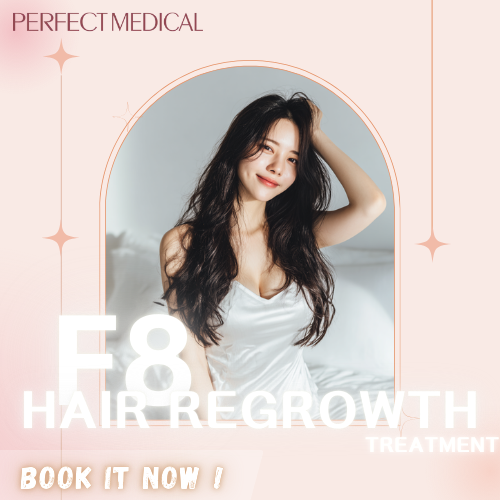
4
Nourishing Your Hair Through a Balanced Diet
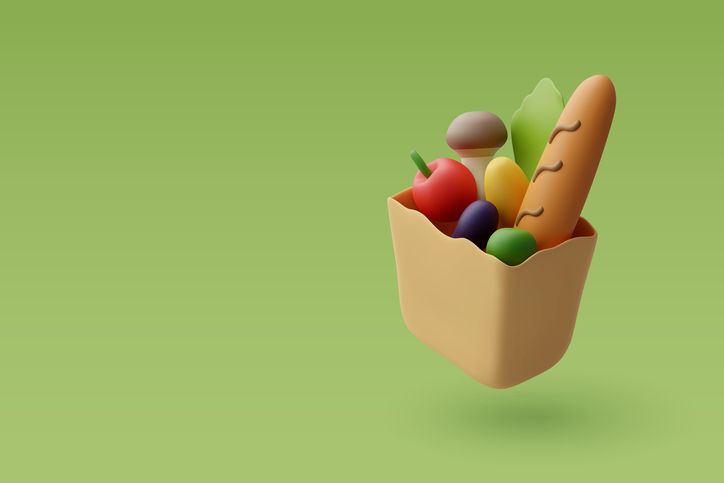
A well-balanced diet plays a crucial role in maintaining healthy hair. Afterall, nutrient deficiency is one of the main causes of losing our hair. You can incorporate the following nutrients into your diet to promote hair growth and reduce hair fall:
1. Protein for strong hair structure
Incorporate protein sources like lean meats, eggs, and legumes into your meals. Protein is crucial for maintaining the structure of your hair strands, making them more resilient to the challenges posed by humidity and environmental factors in Singapore.
2. Omega-3 fatty acids for follicle nourishment
To nourish your hair follicles and maintain healthy scalp conditions, consume foods high in omega-3 fatty acids. Include options like salmon, walnuts, and chia seeds in your diet. These fatty acids can contribute to maintaining a strong foundation for your hair, even in a humid environment.
3. Vitamins to boost hair health
Singapore's tropical climate can impact hair health, making vitamins essential. Prioritise vitamin-rich foods like citrus fruits (vitamin C), dark leafy greens (vitamin A), and nuts (vitamin E). These vitamins play a crucial role in promoting hair growth, combating dryness, and protecting against external stressors.
4. Iron to prevent hair loss
To prevent hair loss due to iron deficiency, include iron-rich foods in your meals. Foods such as spinach, lentils, and tofu can help maintain healthy iron levels, supporting the hair growth cycle even in Singapore's climate.
5. Biotin for hair strength
Incorporate biotin-rich foods like eggs, nuts, and whole grains into your diet. Biotin is a B-vitamin that aids in the production of keratin, a key component of hair. Strengthening your hair's structure through biotin can help combat the effects of humidity.
6. Hydration for hair and scalp
Given Singapore's heat, staying hydrated is crucial for your overall well-being, including your hair health. Drinking enough water helps maintain scalp moisture and supports the transport of essential nutrients to your hair follicles.
7. Antioxidants for hair protection
Consume antioxidant-rich foods like berries and green tea. Antioxidants help protect your hair from oxidative stress caused by factors like pollution and sun exposure, which are particularly relevant in Singapore's environment.
By incorporating these nutrients into your diet, you can nourish your hair from the inside out, addressing the challenges presented by Singapore's climate and promoting healthy, resilient hair.
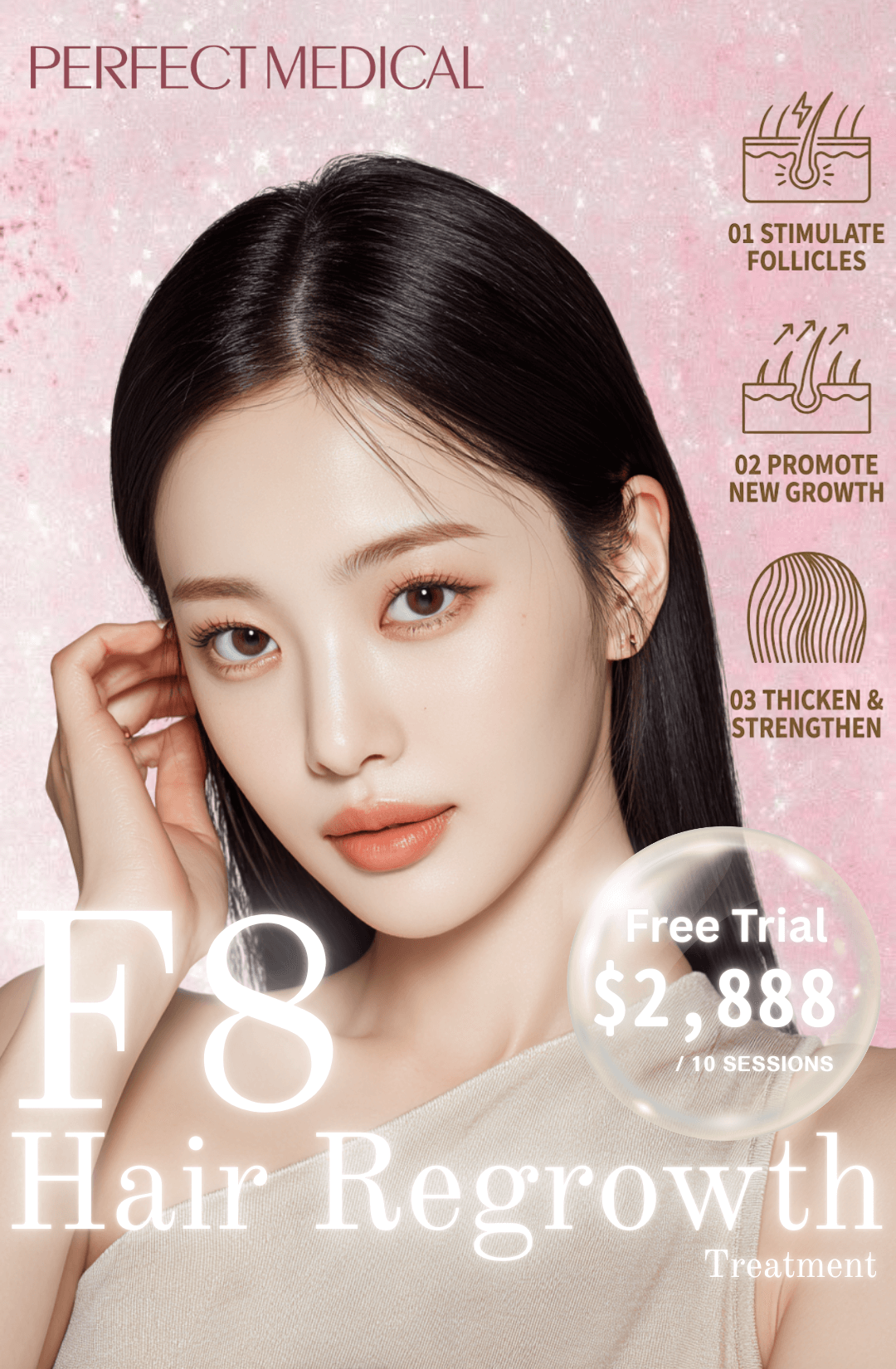
免費體驗
F8 Hair Regrowth Treatment
1 Minute Self-Registration
Date should not be before minimal date
5
More Effective Measures to Stop Hair Loss and Stimulate Hair Growth
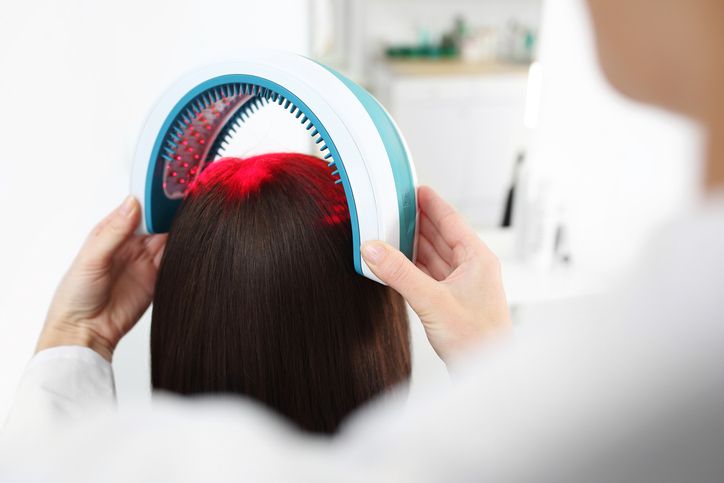
If you're experiencing significant hair loss, addressing hair loss concerns is vital. Thus, an effective hair fall treatment that is suitable for you is extremely important if you would like to keep your hair shafts in check before it turns worse.
1. Platelet-Rich Plasma (PRP) therapy
For individuals seeking a non-surgical approach to hair restoration, PRP therapy is gaining popularity. This treatment involves drawing a small amount of your blood, processing it to isolate platelets, and then injecting the platelet-rich plasma into your scalp. The growth factors present in the plasma can stimulate dormant hair follicles, promoting new hair growth.
2. Hair transplantation
For those experiencing advanced hair loss, hair transplantation can offer a permanent solution. This surgical procedure involves moving hair follicles from areas of the scalp with healthy hair to areas with thinning or balding hair. This technique effectively restores hair density, but it does not really help you to control hair fall.
3. Low-level laser therapy (LLLT)
Singapore's tropical climate can be a factor contributing to hair loss. LLLT is an innovative treatment that uses low-level laser light to stimulate hair follicles and promote hair growth. This non-invasive procedure can enhance blood circulation to the scalp, facilitating the delivery of nutrients to hair follicles. LLLT has gained traction as a convenient and effective option to combat hair loss in Singapore, where humidity and environmental factors can affect hair health.
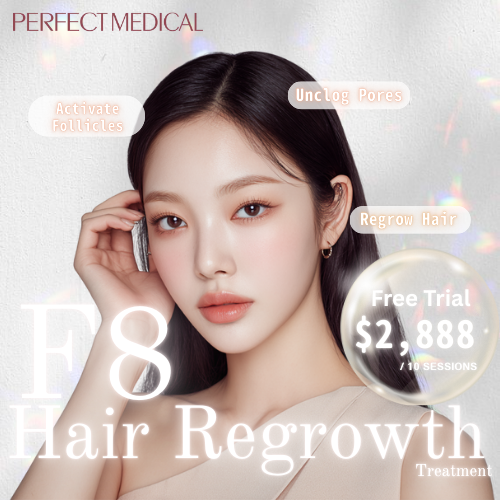
6
Conclusion
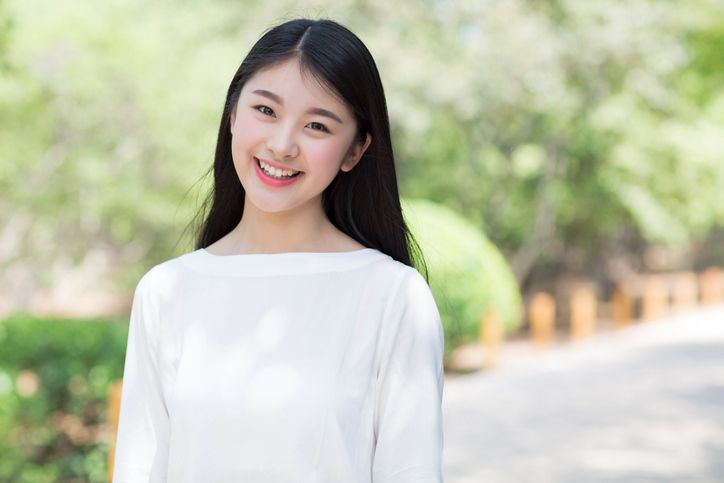
Dealing with hair fall can be a challenging experience, but with the right knowledge and proactive approach, you can effectively reduce hair fall and promote healthy hair growth. Remember to create a suitable hair care routine, incorporate hair-friendly foods into your diet, manage stress, and consider professional treatments when necessary. By taking these steps, you'll be well on your way to achieving luscious and voluminous hair that enhances your overall confidence and well-being!
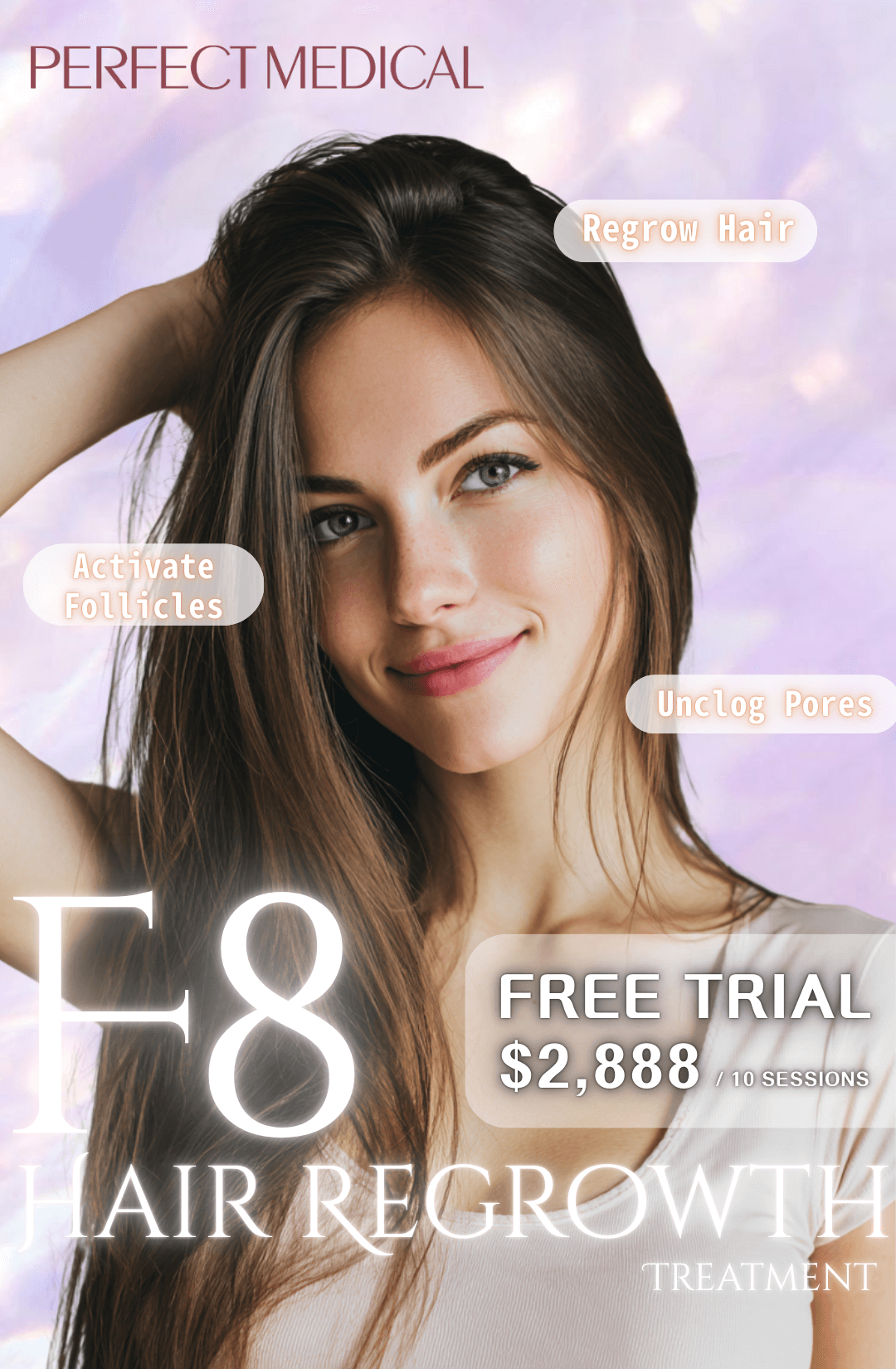
免費體驗
F8 Hair Regrowth Treatment
1 Minute Self-Registration
Date should not be before minimal date
FAQ

1. Can stress cause women to have hair fall? What is the name called?
Yes, stress can indeed lead to hair fall. When a person experiences high levels of stress, it can disrupt the natural hair growth cycle. This disruption can cause hair follicles to enter the resting phase prematurely, leading to a condition called telogen effluvium. Telogen effluvium results in excessive shedding of hair, making it appear as if the hair is thinning or falling out. In women, this condition can be referred to as stress-induced female pattern hair loss. The hormonal changes triggered by stress can also contribute to hair thinning and loss.
2. Is hair thickness affected by age?
Yes, hair thickness is influenced by age. As individuals grow older, several factors can contribute to changes in hair thickness. These include hormonal shifts, reduced blood circulation to the scalp, and the gradual shrinkage of hair follicles. These factors collectively result in thinner and finer hair strands over time.
3. Can I prevent hair fall through diet alone?
While a well-balanced diet is a crucial aspect of maintaining healthy hair, preventing hair fall might require a more comprehensive approach. A diet rich in essential nutrients such as protein, vitamins, and minerals supports hair health, but external factors like stress, genetics, and environmental conditions also play a role in hair fall. Combining a proper diet with a suitable hair care routine and lifestyle modifications, such as managing stress levels and avoiding harsh styling practices, is recommended for a more effective strategy against hair fall.
4. How long does it take to see results from hair fall treatments?
The timeline for observing results from hair fall treatments can vary widely among individuals. Some people might start noticing improvements within a few months of starting treatment, while others might require more time. Factors that can influence the timeline include the type of treatment, the severity of hair fall, individual response to treatment, and consistency in following the recommended regimen. Patience is essential when pursuing hair fall treatments, as visible results may take time to become noticeable.
5. Does hair fall affect both men and women equally?
Yes, hair fall can affect both men and women, although the patterns and underlying causes can differ. Male pattern baldness, also known as androgenetic alopecia, is more commonly associated with men. It typically follows a predictable pattern of receding hairline and thinning at the crown. On the other hand, women can also experience hair thinning and loss, often characterised by diffuse shedding or widening of the part. Female pattern hair loss can be influenced by factors like genetics, hormonal changes, and age.





